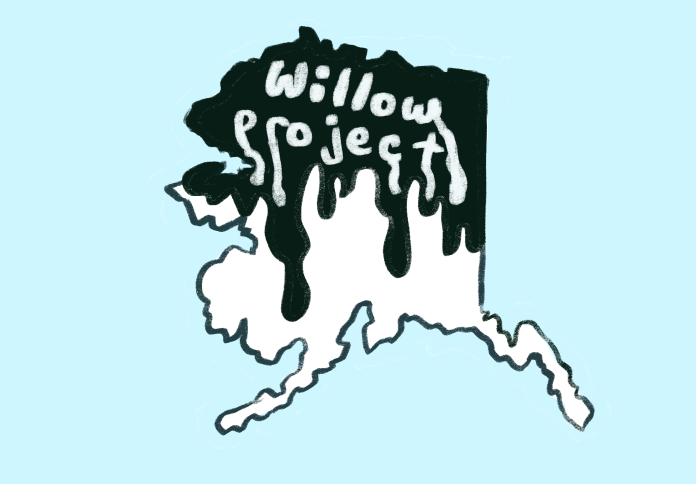Hailey Hill
Science and Technology Editor
The Willow Project, a massive proposed oil-drilling expedition in Alaska’s North Slope region, has received widespread criticism and public opposition after an online petition to stop the project went viral.
Supported by the Biden administration, the Willow Project is an $8 billion proposal to create new oil fields consisting of five drilling sites in Alaska’s Northern Slope. The prospective project site is located within the National Petroleum Reserve-Alaska and is the largest parcel of untouched land in the United States at 23 million acres. If approved, the project would be the biggest American oil drilling project in decades, generating an estimated 180,000 gallons of oil per day.
Many Alaskan lawmakers and politicians back the project, claiming it will generate jobs and funding for underserved communities in addition to developing infrastructure and services in the area. However, Alaskan indigenous groups, environmentalists, and the public have become passionately opposed to the Willow Project, sharing the sentiment that we simply cannot afford a project that would exacerbate the harms of environmental degradation and climate change.
Karlin Nageak Itchoak, a vocal critic of the Willow Project and Senior Regional Director of Wilderness Society, describes the project as “a carbon bomb that cannot be allowed to explode in the Arctic.”
Itchoak’s statement isn’t an exaggeration: if completed, the operations involved in the Willow Project are projected to release “278 million tons of greenhouse gasses over [30] years.” The general consensus among researchers and environmentalists is that annual emissions need to decrease drastically by 2050 in order to slow the rise in global temperature, and a project as large-scale as Willow directly undermines critical progress towards achieving this goal. Such apparent disregard for scientific fact in favor of economic gain is alarming to many, especially considering that the Arctic region is already estimated to be warming up to four times faster than the rest of the planet.
Itchoak also argues that the harms of the Willow Project — and global warming as a whole — fall directly and disproportionately on the indigenous peoples of the Northern Slope region, saying, “Our native villages are eroding into the sea, thawing permafrost is making infrastructure insecure, and food sources are disappearing … and this project would just exacerbate and speed up the climate crisis in the Arctic.”
Another major criticism of the Willow Project is that many are concerned President Biden is “backtracking” on campaign promises to fight climate change. Although the President has certainly made some significant legislative moves in this area, including laws to facilitate the expansion of clean energy, approval of the exact sort of project Biden had promised to move away from is creating a sense of distrust and anger at his administration.
Kristen Monsell, senior attorney at the Center for Biological Diversity, expressed this sentiment in an interview with The Guardian.
“It’s outrageous that Biden seems ready to greenlight the massively destructive Willow Project, prioritizing oil industry profits over the future of polar bears and other Arctic wildlife … We’ll keep fighting it until it’s scrapped,” Monsell said.
The viral change.org online petition to stop the Willow Project is a reflection of the widespread opposition to a project that many believe puts the future of our planet in further doubt. As of March 5, almost three million people have signed the petition — signaling a sign of hope that perhaps it is not too late to stop the Willow Project.











